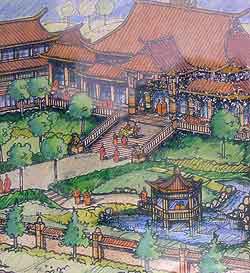Buddhist group sues county over cease-and-desist order
By TOM PFINGSTEN, NC Times Staff Writer, June 10, 2005
Bonsall, CA (USA) -- A Buddhist congregation seeking to establish a temple in Bonsall has filed a lawsuit against the county asking that the group be allowed to resume temporary religious observances and meditation at its Camino del Rey property.
 The suit seeks relief from a county cease and desist order issued April 4 that forbids the group from assemblinge or practicing organized meditation at the site until a major use permit is issued, a spokesman for the congregation said Thursday.
The suit seeks relief from a county cease and desist order issued April 4 that forbids the group from assemblinge or practicing organized meditation at the site until a major use permit is issued, a spokesman for the congregation said Thursday.
In the text of the suit, the group points out that the county had allowed services at the Camino del Rey site in the past, and said the cease and desist order "will severely harm (the congregation's) religious exercise."
The complaint, which names the San Diego County and Department of Planning and Land Use Director Gary Pryor as defendants, was filed June 3 in the San Diego U.S. District Court.
Organized formally in 2001 as the nonprofit "Vietnamese Buddhist Meditation Congregation Inc.," the group has practiced its religion regularly at the site for more than a year, project spokesman Chris Brown said Thursday.
Brown said that the cease and desist order sent to the congregation in April included several speculative reasons for blocking religious assemblies.
"The county has told us to stop all activities out at the site, religious or otherwise," Brown said. "That's a point of contention, how much the county can limit a group's ability to practice its religion."
The lawsuit alleges that the county changed its stance toward the congregation because of "community hostility," presumably on the part of Bonsall residents who are opposed to the temple. The suit also accuses the county of discrimination in the way it applied land use ordinances.
Last year, the group said it would seek to build a temple complex with a 6,196-square-foot main hall, a 7,664 meditation hall, an 8,936-square foot dormitory for its monks and parking for 72 vehicles.
Brown said Thursday that the nature of the proposal has not changed significantly since then, though a revised application was filed in April. Updated square footage was not available.
Eliot Alazraki, senior deputy counsel for the county, said Thursday the reason for issuing the cease and desist order was that the group had fallen behind in processing its major use permit, which is required for organizing religious assemblies on land designated for agricultural purposes.
"The property is zoned for limited agricultural use, which allows a lot of different uses," Alazraki said of the parcel at 6326 Camino del Rey. "Most civic uses require a major use permit, including religious assembly."
He said that anyone seeking to use land zoned as agricultural for a child care center, community recreation or a cultural exhibit, for example, would also require a major use permit.
"What frequently happens is that someone begins using property ... and they don't know a permit is required," he continued. "If they pursue a permit diligently, the county may allow them to use the property while their permit is pending."
Alazraki said the Buddhist congregation had fallen about six months behind schedule in processing the major use permit application.
"The county told them to stop their religious assembly, based on the fact that ... they were very far behind in processing their permit," he said.
The next step for the lawsuit, said attorney Bill Fischbeck, who is representing the Buddhist group, is to seek an injunction that would prohibit the county from enforcing their cease and desist order.
"It would allow (the congregation) to do all those things that they have been doing that they would like to continue with," he said, pointing out that the lawsuit only addresses what will happen between now and when the congregation is issued a permit. "They're fully compliant with all of the county's use permit application procedures, and they are (processing) their application under those rules."
In the past, Sunday morning activities at the site have drawn protestors, who cited concerns of noise and traffic that the temple would create in the residential neighborhood.

 The suit seeks relief from a county cease and desist order issued April 4 that forbids the group from assemblinge or practicing organized meditation at the site until a major use permit is issued, a spokesman for the congregation said Thursday.
The suit seeks relief from a county cease and desist order issued April 4 that forbids the group from assemblinge or practicing organized meditation at the site until a major use permit is issued, a spokesman for the congregation said Thursday.